International Relations: Great Power Management Analysis
VerifiedAdded on 2023/01/17
|10
|2794
|39
Report
AI Summary
This report analyzes the concept of Great Power Management (GPM) as a primary institution in international society, examining its historical evolution and structural dynamics. It explores how GPM, alongside institutions like the balance of power, international law, and diplomacy, shapes the internati...
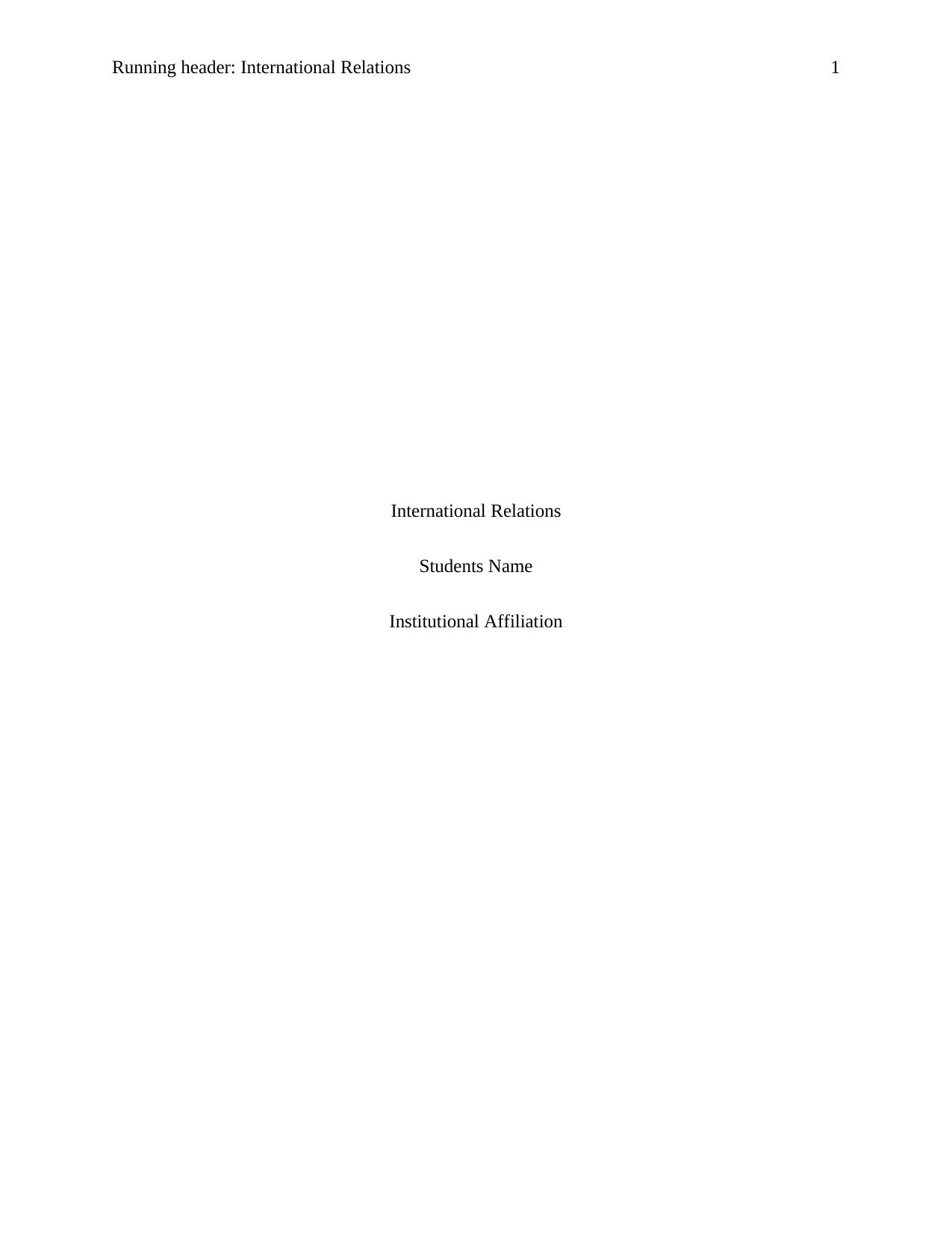
Running header: International Relations 1
International Relations
Students Name
Institutional Affiliation
International Relations
Students Name
Institutional Affiliation
Paraphrase This Document
Need a fresh take? Get an instant paraphrase of this document with our AI Paraphraser
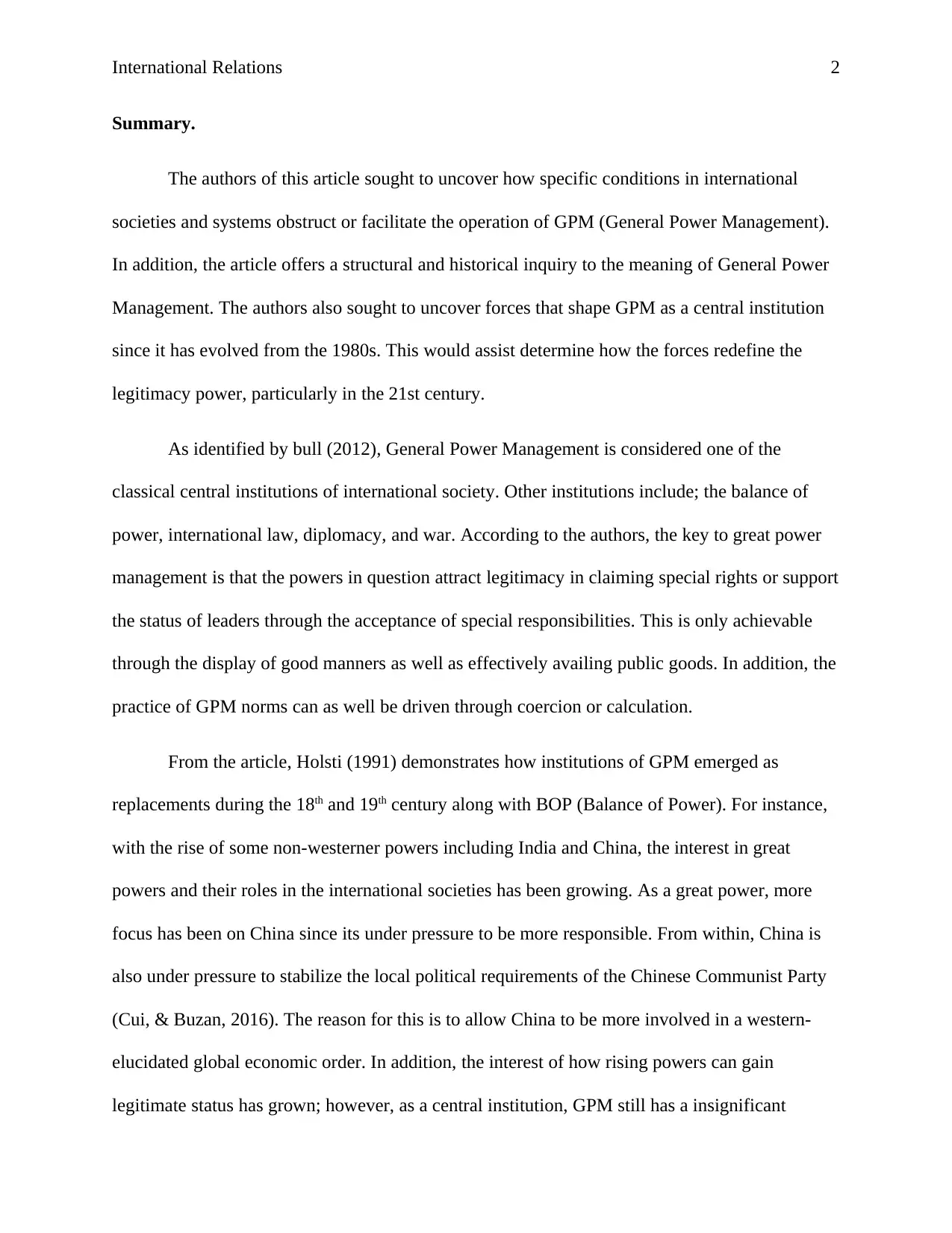
International Relations 2
Summary.
The authors of this article sought to uncover how specific conditions in international
societies and systems obstruct or facilitate the operation of GPM (General Power Management).
In addition, the article offers a structural and historical inquiry to the meaning of General Power
Management. The authors also sought to uncover forces that shape GPM as a central institution
since it has evolved from the 1980s. This would assist determine how the forces redefine the
legitimacy power, particularly in the 21st century.
As identified by bull (2012), General Power Management is considered one of the
classical central institutions of international society. Other institutions include; the balance of
power, international law, diplomacy, and war. According to the authors, the key to great power
management is that the powers in question attract legitimacy in claiming special rights or support
the status of leaders through the acceptance of special responsibilities. This is only achievable
through the display of good manners as well as effectively availing public goods. In addition, the
practice of GPM norms can as well be driven through coercion or calculation.
From the article, Holsti (1991) demonstrates how institutions of GPM emerged as
replacements during the 18th and 19th century along with BOP (Balance of Power). For instance,
with the rise of some non-westerner powers including India and China, the interest in great
powers and their roles in the international societies has been growing. As a great power, more
focus has been on China since its under pressure to be more responsible. From within, China is
also under pressure to stabilize the local political requirements of the Chinese Communist Party
(Cui, & Buzan, 2016). The reason for this is to allow China to be more involved in a western-
elucidated global economic order. In addition, the interest of how rising powers can gain
legitimate status has grown; however, as a central institution, GPM still has a insignificant
Summary.
The authors of this article sought to uncover how specific conditions in international
societies and systems obstruct or facilitate the operation of GPM (General Power Management).
In addition, the article offers a structural and historical inquiry to the meaning of General Power
Management. The authors also sought to uncover forces that shape GPM as a central institution
since it has evolved from the 1980s. This would assist determine how the forces redefine the
legitimacy power, particularly in the 21st century.
As identified by bull (2012), General Power Management is considered one of the
classical central institutions of international society. Other institutions include; the balance of
power, international law, diplomacy, and war. According to the authors, the key to great power
management is that the powers in question attract legitimacy in claiming special rights or support
the status of leaders through the acceptance of special responsibilities. This is only achievable
through the display of good manners as well as effectively availing public goods. In addition, the
practice of GPM norms can as well be driven through coercion or calculation.
From the article, Holsti (1991) demonstrates how institutions of GPM emerged as
replacements during the 18th and 19th century along with BOP (Balance of Power). For instance,
with the rise of some non-westerner powers including India and China, the interest in great
powers and their roles in the international societies has been growing. As a great power, more
focus has been on China since its under pressure to be more responsible. From within, China is
also under pressure to stabilize the local political requirements of the Chinese Communist Party
(Cui, & Buzan, 2016). The reason for this is to allow China to be more involved in a western-
elucidated global economic order. In addition, the interest of how rising powers can gain
legitimate status has grown; however, as a central institution, GPM still has a insignificant
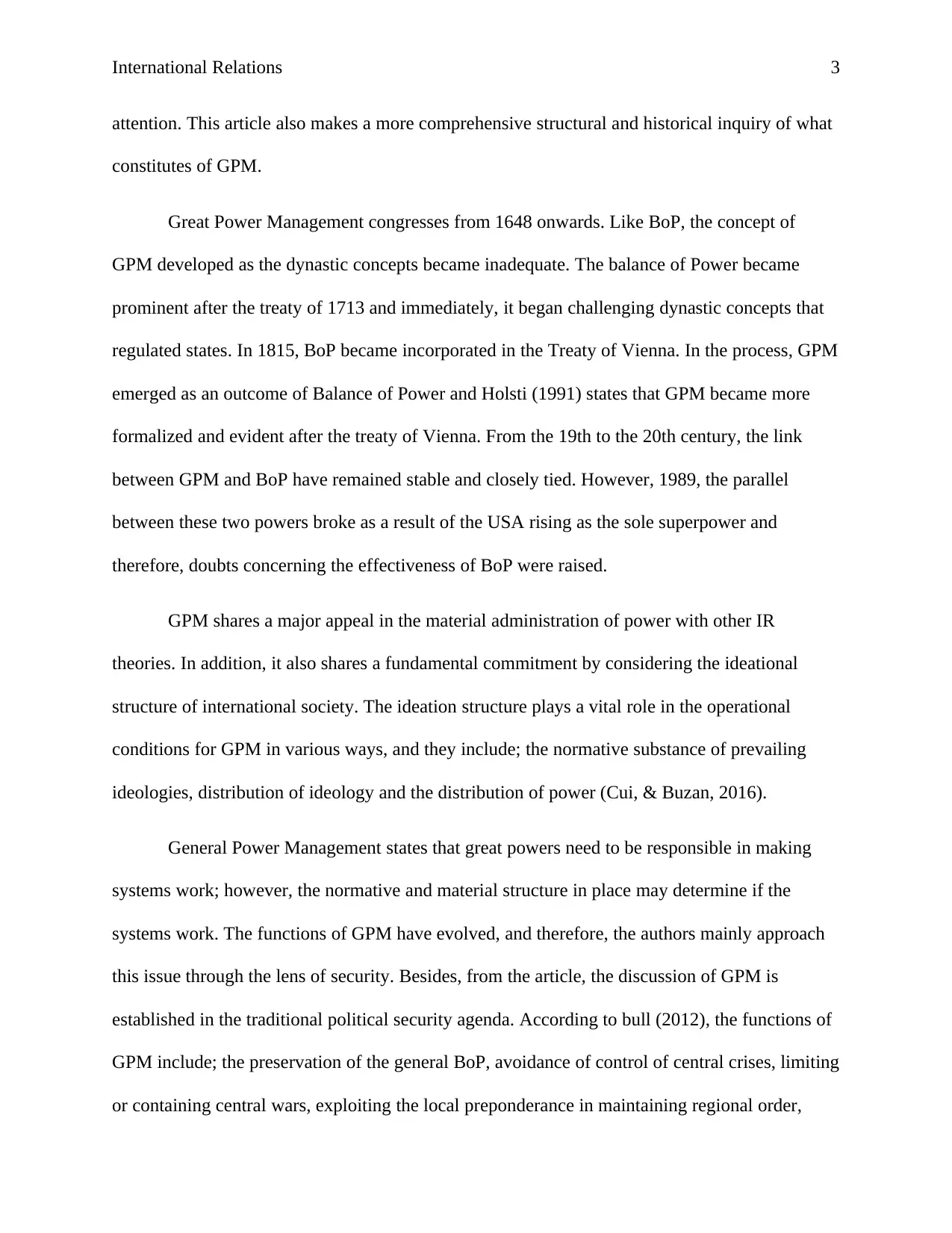
International Relations 3
attention. This article also makes a more comprehensive structural and historical inquiry of what
constitutes of GPM.
Great Power Management congresses from 1648 onwards. Like BoP, the concept of
GPM developed as the dynastic concepts became inadequate. The balance of Power became
prominent after the treaty of 1713 and immediately, it began challenging dynastic concepts that
regulated states. In 1815, BoP became incorporated in the Treaty of Vienna. In the process, GPM
emerged as an outcome of Balance of Power and Holsti (1991) states that GPM became more
formalized and evident after the treaty of Vienna. From the 19th to the 20th century, the link
between GPM and BoP have remained stable and closely tied. However, 1989, the parallel
between these two powers broke as a result of the USA rising as the sole superpower and
therefore, doubts concerning the effectiveness of BoP were raised.
GPM shares a major appeal in the material administration of power with other IR
theories. In addition, it also shares a fundamental commitment by considering the ideational
structure of international society. The ideation structure plays a vital role in the operational
conditions for GPM in various ways, and they include; the normative substance of prevailing
ideologies, distribution of ideology and the distribution of power (Cui, & Buzan, 2016).
General Power Management states that great powers need to be responsible in making
systems work; however, the normative and material structure in place may determine if the
systems work. The functions of GPM have evolved, and therefore, the authors mainly approach
this issue through the lens of security. Besides, from the article, the discussion of GPM is
established in the traditional political security agenda. According to bull (2012), the functions of
GPM include; the preservation of the general BoP, avoidance of control of central crises, limiting
or containing central wars, exploiting the local preponderance in maintaining regional order,
attention. This article also makes a more comprehensive structural and historical inquiry of what
constitutes of GPM.
Great Power Management congresses from 1648 onwards. Like BoP, the concept of
GPM developed as the dynastic concepts became inadequate. The balance of Power became
prominent after the treaty of 1713 and immediately, it began challenging dynastic concepts that
regulated states. In 1815, BoP became incorporated in the Treaty of Vienna. In the process, GPM
emerged as an outcome of Balance of Power and Holsti (1991) states that GPM became more
formalized and evident after the treaty of Vienna. From the 19th to the 20th century, the link
between GPM and BoP have remained stable and closely tied. However, 1989, the parallel
between these two powers broke as a result of the USA rising as the sole superpower and
therefore, doubts concerning the effectiveness of BoP were raised.
GPM shares a major appeal in the material administration of power with other IR
theories. In addition, it also shares a fundamental commitment by considering the ideational
structure of international society. The ideation structure plays a vital role in the operational
conditions for GPM in various ways, and they include; the normative substance of prevailing
ideologies, distribution of ideology and the distribution of power (Cui, & Buzan, 2016).
General Power Management states that great powers need to be responsible in making
systems work; however, the normative and material structure in place may determine if the
systems work. The functions of GPM have evolved, and therefore, the authors mainly approach
this issue through the lens of security. Besides, from the article, the discussion of GPM is
established in the traditional political security agenda. According to bull (2012), the functions of
GPM include; the preservation of the general BoP, avoidance of control of central crises, limiting
or containing central wars, exploiting the local preponderance in maintaining regional order,
⊘ This is a preview!⊘
Do you want full access?
Subscribe today to unlock all pages.

Trusted by 1+ million students worldwide
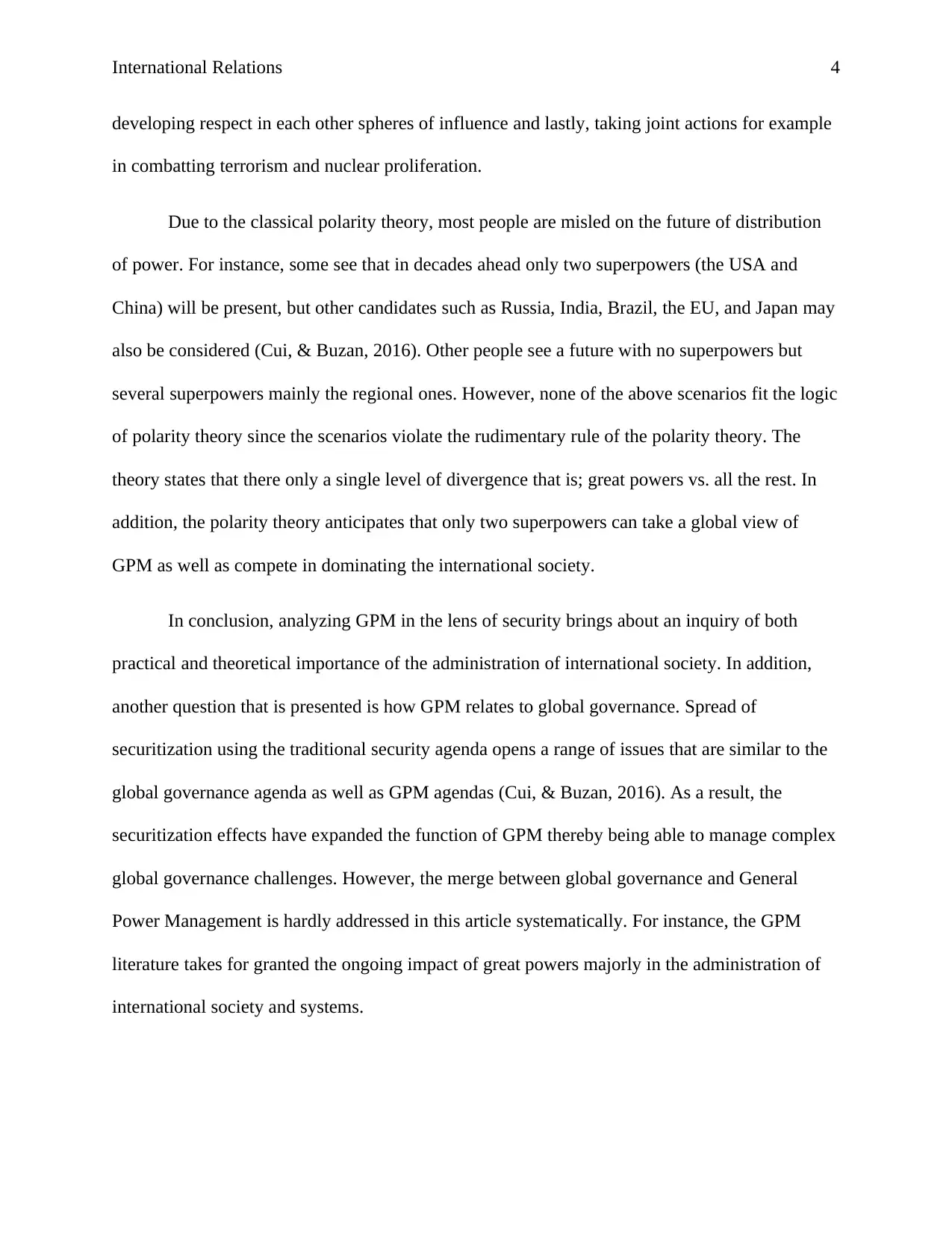
International Relations 4
developing respect in each other spheres of influence and lastly, taking joint actions for example
in combatting terrorism and nuclear proliferation.
Due to the classical polarity theory, most people are misled on the future of distribution
of power. For instance, some see that in decades ahead only two superpowers (the USA and
China) will be present, but other candidates such as Russia, India, Brazil, the EU, and Japan may
also be considered (Cui, & Buzan, 2016). Other people see a future with no superpowers but
several superpowers mainly the regional ones. However, none of the above scenarios fit the logic
of polarity theory since the scenarios violate the rudimentary rule of the polarity theory. The
theory states that there only a single level of divergence that is; great powers vs. all the rest. In
addition, the polarity theory anticipates that only two superpowers can take a global view of
GPM as well as compete in dominating the international society.
In conclusion, analyzing GPM in the lens of security brings about an inquiry of both
practical and theoretical importance of the administration of international society. In addition,
another question that is presented is how GPM relates to global governance. Spread of
securitization using the traditional security agenda opens a range of issues that are similar to the
global governance agenda as well as GPM agendas (Cui, & Buzan, 2016). As a result, the
securitization effects have expanded the function of GPM thereby being able to manage complex
global governance challenges. However, the merge between global governance and General
Power Management is hardly addressed in this article systematically. For instance, the GPM
literature takes for granted the ongoing impact of great powers majorly in the administration of
international society and systems.
developing respect in each other spheres of influence and lastly, taking joint actions for example
in combatting terrorism and nuclear proliferation.
Due to the classical polarity theory, most people are misled on the future of distribution
of power. For instance, some see that in decades ahead only two superpowers (the USA and
China) will be present, but other candidates such as Russia, India, Brazil, the EU, and Japan may
also be considered (Cui, & Buzan, 2016). Other people see a future with no superpowers but
several superpowers mainly the regional ones. However, none of the above scenarios fit the logic
of polarity theory since the scenarios violate the rudimentary rule of the polarity theory. The
theory states that there only a single level of divergence that is; great powers vs. all the rest. In
addition, the polarity theory anticipates that only two superpowers can take a global view of
GPM as well as compete in dominating the international society.
In conclusion, analyzing GPM in the lens of security brings about an inquiry of both
practical and theoretical importance of the administration of international society. In addition,
another question that is presented is how GPM relates to global governance. Spread of
securitization using the traditional security agenda opens a range of issues that are similar to the
global governance agenda as well as GPM agendas (Cui, & Buzan, 2016). As a result, the
securitization effects have expanded the function of GPM thereby being able to manage complex
global governance challenges. However, the merge between global governance and General
Power Management is hardly addressed in this article systematically. For instance, the GPM
literature takes for granted the ongoing impact of great powers majorly in the administration of
international society and systems.
Paraphrase This Document
Need a fresh take? Get an instant paraphrase of this document with our AI Paraphraser
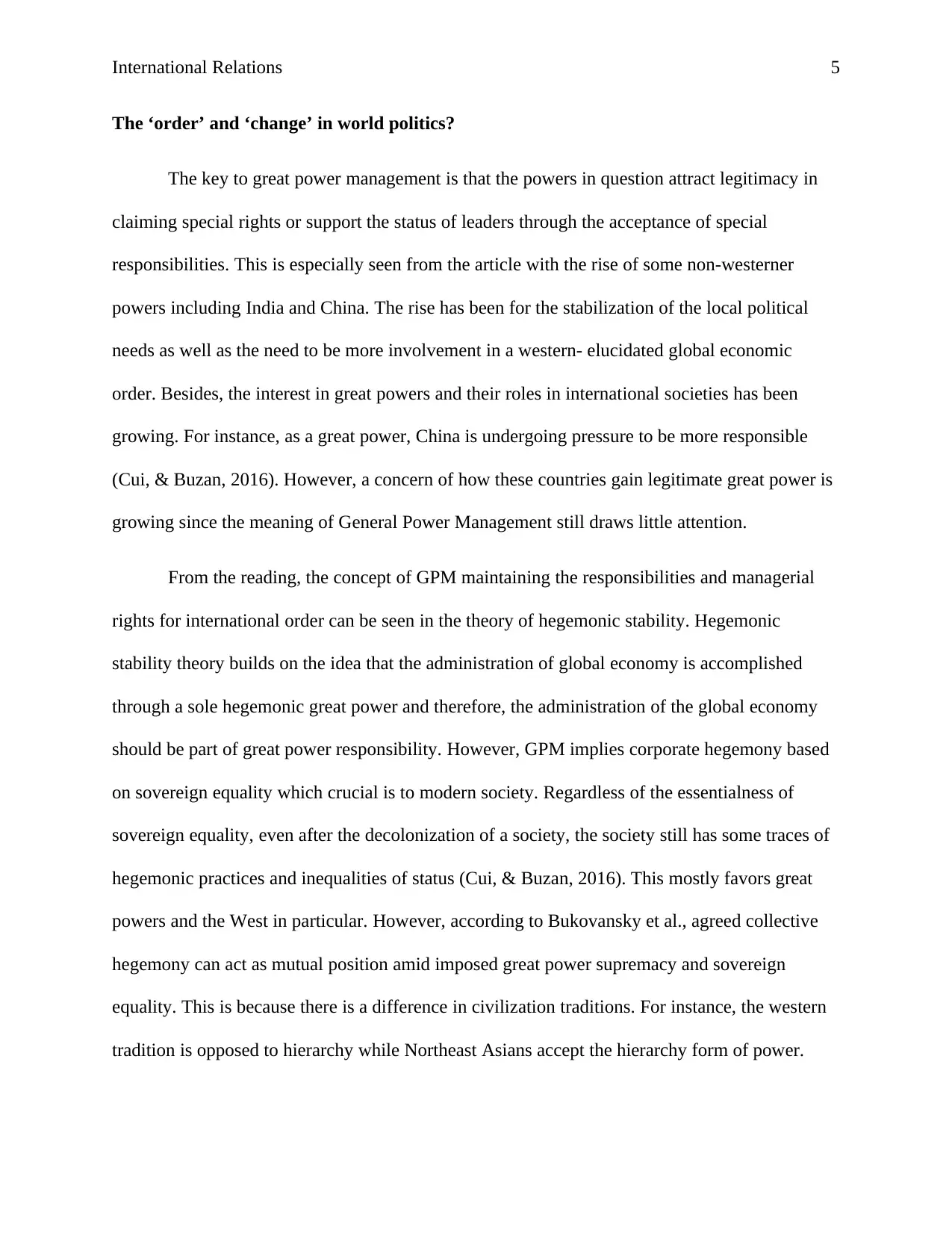
International Relations 5
The ‘order’ and ‘change’ in world politics?
The key to great power management is that the powers in question attract legitimacy in
claiming special rights or support the status of leaders through the acceptance of special
responsibilities. This is especially seen from the article with the rise of some non-westerner
powers including India and China. The rise has been for the stabilization of the local political
needs as well as the need to be more involvement in a western- elucidated global economic
order. Besides, the interest in great powers and their roles in international societies has been
growing. For instance, as a great power, China is undergoing pressure to be more responsible
(Cui, & Buzan, 2016). However, a concern of how these countries gain legitimate great power is
growing since the meaning of General Power Management still draws little attention.
From the reading, the concept of GPM maintaining the responsibilities and managerial
rights for international order can be seen in the theory of hegemonic stability. Hegemonic
stability theory builds on the idea that the administration of global economy is accomplished
through a sole hegemonic great power and therefore, the administration of the global economy
should be part of great power responsibility. However, GPM implies corporate hegemony based
on sovereign equality which crucial is to modern society. Regardless of the essentialness of
sovereign equality, even after the decolonization of a society, the society still has some traces of
hegemonic practices and inequalities of status (Cui, & Buzan, 2016). This mostly favors great
powers and the West in particular. However, according to Bukovansky et al., agreed collective
hegemony can act as mutual position amid imposed great power supremacy and sovereign
equality. This is because there is a difference in civilization traditions. For instance, the western
tradition is opposed to hierarchy while Northeast Asians accept the hierarchy form of power.
The ‘order’ and ‘change’ in world politics?
The key to great power management is that the powers in question attract legitimacy in
claiming special rights or support the status of leaders through the acceptance of special
responsibilities. This is especially seen from the article with the rise of some non-westerner
powers including India and China. The rise has been for the stabilization of the local political
needs as well as the need to be more involvement in a western- elucidated global economic
order. Besides, the interest in great powers and their roles in international societies has been
growing. For instance, as a great power, China is undergoing pressure to be more responsible
(Cui, & Buzan, 2016). However, a concern of how these countries gain legitimate great power is
growing since the meaning of General Power Management still draws little attention.
From the reading, the concept of GPM maintaining the responsibilities and managerial
rights for international order can be seen in the theory of hegemonic stability. Hegemonic
stability theory builds on the idea that the administration of global economy is accomplished
through a sole hegemonic great power and therefore, the administration of the global economy
should be part of great power responsibility. However, GPM implies corporate hegemony based
on sovereign equality which crucial is to modern society. Regardless of the essentialness of
sovereign equality, even after the decolonization of a society, the society still has some traces of
hegemonic practices and inequalities of status (Cui, & Buzan, 2016). This mostly favors great
powers and the West in particular. However, according to Bukovansky et al., agreed collective
hegemony can act as mutual position amid imposed great power supremacy and sovereign
equality. This is because there is a difference in civilization traditions. For instance, the western
tradition is opposed to hierarchy while Northeast Asians accept the hierarchy form of power.
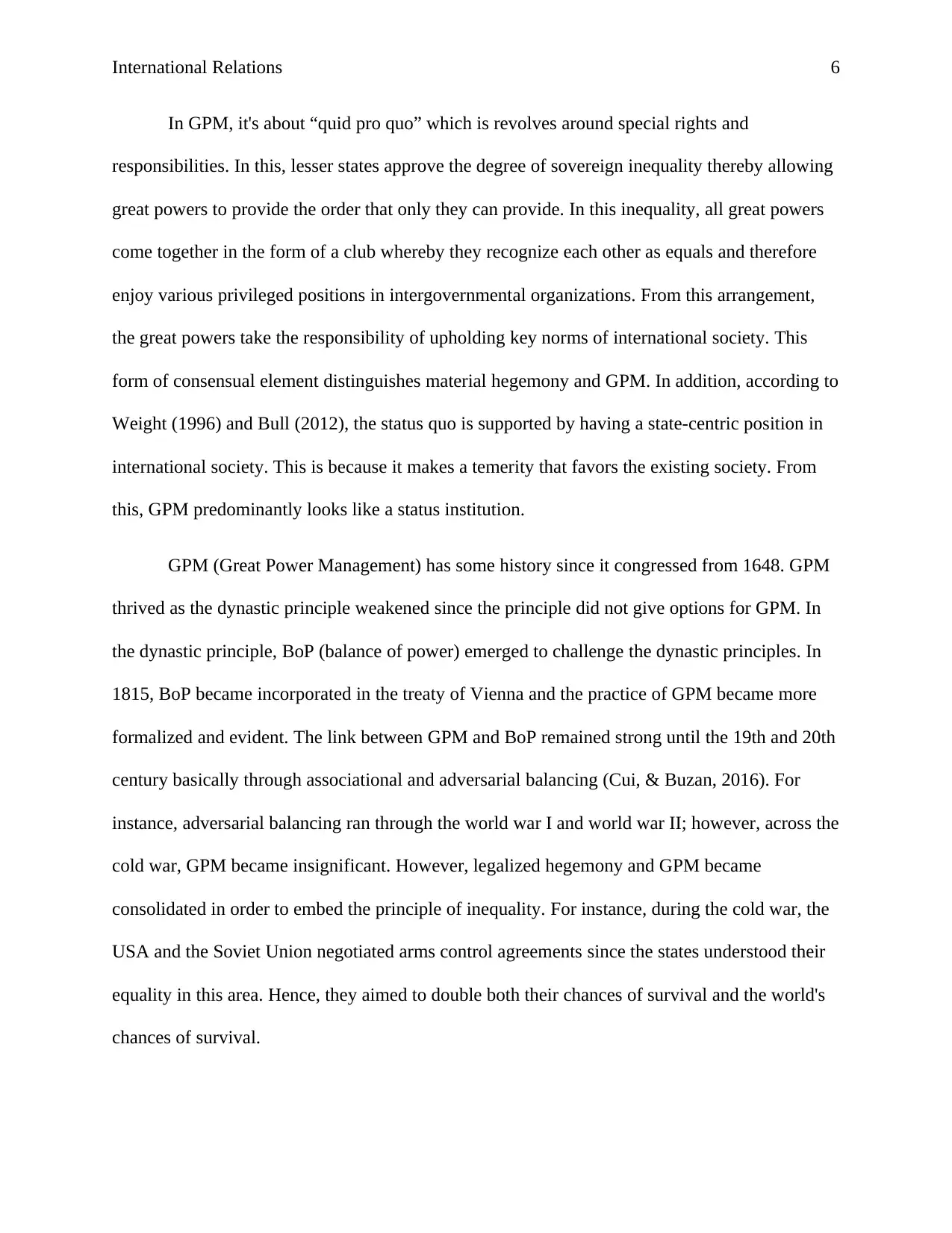
International Relations 6
In GPM, it's about “quid pro quo” which is revolves around special rights and
responsibilities. In this, lesser states approve the degree of sovereign inequality thereby allowing
great powers to provide the order that only they can provide. In this inequality, all great powers
come together in the form of a club whereby they recognize each other as equals and therefore
enjoy various privileged positions in intergovernmental organizations. From this arrangement,
the great powers take the responsibility of upholding key norms of international society. This
form of consensual element distinguishes material hegemony and GPM. In addition, according to
Weight (1996) and Bull (2012), the status quo is supported by having a state-centric position in
international society. This is because it makes a temerity that favors the existing society. From
this, GPM predominantly looks like a status institution.
GPM (Great Power Management) has some history since it congressed from 1648. GPM
thrived as the dynastic principle weakened since the principle did not give options for GPM. In
the dynastic principle, BoP (balance of power) emerged to challenge the dynastic principles. In
1815, BoP became incorporated in the treaty of Vienna and the practice of GPM became more
formalized and evident. The link between GPM and BoP remained strong until the 19th and 20th
century basically through associational and adversarial balancing (Cui, & Buzan, 2016). For
instance, adversarial balancing ran through the world war I and world war II; however, across the
cold war, GPM became insignificant. However, legalized hegemony and GPM became
consolidated in order to embed the principle of inequality. For instance, during the cold war, the
USA and the Soviet Union negotiated arms control agreements since the states understood their
equality in this area. Hence, they aimed to double both their chances of survival and the world's
chances of survival.
In GPM, it's about “quid pro quo” which is revolves around special rights and
responsibilities. In this, lesser states approve the degree of sovereign inequality thereby allowing
great powers to provide the order that only they can provide. In this inequality, all great powers
come together in the form of a club whereby they recognize each other as equals and therefore
enjoy various privileged positions in intergovernmental organizations. From this arrangement,
the great powers take the responsibility of upholding key norms of international society. This
form of consensual element distinguishes material hegemony and GPM. In addition, according to
Weight (1996) and Bull (2012), the status quo is supported by having a state-centric position in
international society. This is because it makes a temerity that favors the existing society. From
this, GPM predominantly looks like a status institution.
GPM (Great Power Management) has some history since it congressed from 1648. GPM
thrived as the dynastic principle weakened since the principle did not give options for GPM. In
the dynastic principle, BoP (balance of power) emerged to challenge the dynastic principles. In
1815, BoP became incorporated in the treaty of Vienna and the practice of GPM became more
formalized and evident. The link between GPM and BoP remained strong until the 19th and 20th
century basically through associational and adversarial balancing (Cui, & Buzan, 2016). For
instance, adversarial balancing ran through the world war I and world war II; however, across the
cold war, GPM became insignificant. However, legalized hegemony and GPM became
consolidated in order to embed the principle of inequality. For instance, during the cold war, the
USA and the Soviet Union negotiated arms control agreements since the states understood their
equality in this area. Hence, they aimed to double both their chances of survival and the world's
chances of survival.
⊘ This is a preview!⊘
Do you want full access?
Subscribe today to unlock all pages.

Trusted by 1+ million students worldwide
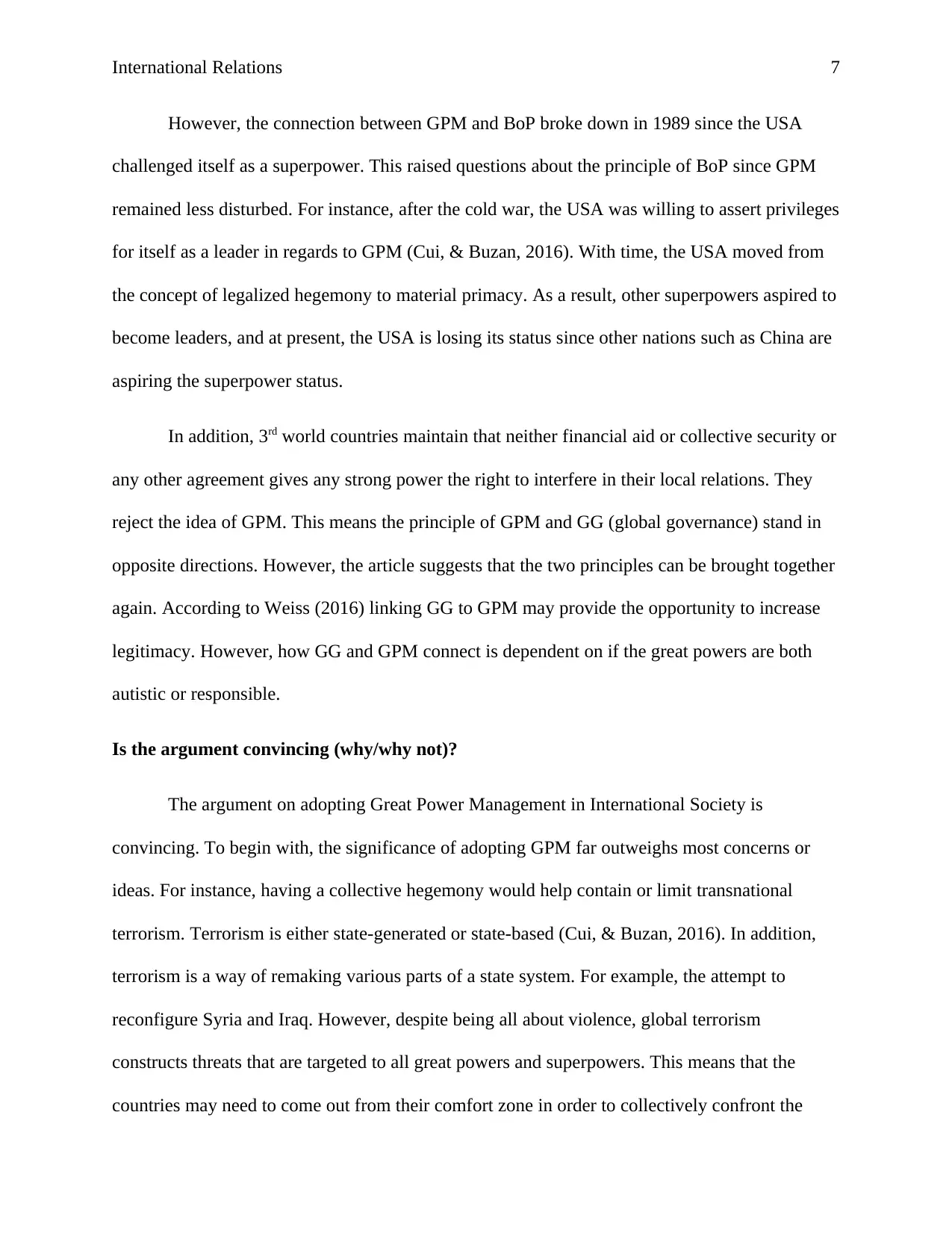
International Relations 7
However, the connection between GPM and BoP broke down in 1989 since the USA
challenged itself as a superpower. This raised questions about the principle of BoP since GPM
remained less disturbed. For instance, after the cold war, the USA was willing to assert privileges
for itself as a leader in regards to GPM (Cui, & Buzan, 2016). With time, the USA moved from
the concept of legalized hegemony to material primacy. As a result, other superpowers aspired to
become leaders, and at present, the USA is losing its status since other nations such as China are
aspiring the superpower status.
In addition, 3rd world countries maintain that neither financial aid or collective security or
any other agreement gives any strong power the right to interfere in their local relations. They
reject the idea of GPM. This means the principle of GPM and GG (global governance) stand in
opposite directions. However, the article suggests that the two principles can be brought together
again. According to Weiss (2016) linking GG to GPM may provide the opportunity to increase
legitimacy. However, how GG and GPM connect is dependent on if the great powers are both
autistic or responsible.
Is the argument convincing (why/why not)?
The argument on adopting Great Power Management in International Society is
convincing. To begin with, the significance of adopting GPM far outweighs most concerns or
ideas. For instance, having a collective hegemony would help contain or limit transnational
terrorism. Terrorism is either state-generated or state-based (Cui, & Buzan, 2016). In addition,
terrorism is a way of remaking various parts of a state system. For example, the attempt to
reconfigure Syria and Iraq. However, despite being all about violence, global terrorism
constructs threats that are targeted to all great powers and superpowers. This means that the
countries may need to come out from their comfort zone in order to collectively confront the
However, the connection between GPM and BoP broke down in 1989 since the USA
challenged itself as a superpower. This raised questions about the principle of BoP since GPM
remained less disturbed. For instance, after the cold war, the USA was willing to assert privileges
for itself as a leader in regards to GPM (Cui, & Buzan, 2016). With time, the USA moved from
the concept of legalized hegemony to material primacy. As a result, other superpowers aspired to
become leaders, and at present, the USA is losing its status since other nations such as China are
aspiring the superpower status.
In addition, 3rd world countries maintain that neither financial aid or collective security or
any other agreement gives any strong power the right to interfere in their local relations. They
reject the idea of GPM. This means the principle of GPM and GG (global governance) stand in
opposite directions. However, the article suggests that the two principles can be brought together
again. According to Weiss (2016) linking GG to GPM may provide the opportunity to increase
legitimacy. However, how GG and GPM connect is dependent on if the great powers are both
autistic or responsible.
Is the argument convincing (why/why not)?
The argument on adopting Great Power Management in International Society is
convincing. To begin with, the significance of adopting GPM far outweighs most concerns or
ideas. For instance, having a collective hegemony would help contain or limit transnational
terrorism. Terrorism is either state-generated or state-based (Cui, & Buzan, 2016). In addition,
terrorism is a way of remaking various parts of a state system. For example, the attempt to
reconfigure Syria and Iraq. However, despite being all about violence, global terrorism
constructs threats that are targeted to all great powers and superpowers. This means that the
countries may need to come out from their comfort zone in order to collectively confront the
Paraphrase This Document
Need a fresh take? Get an instant paraphrase of this document with our AI Paraphraser
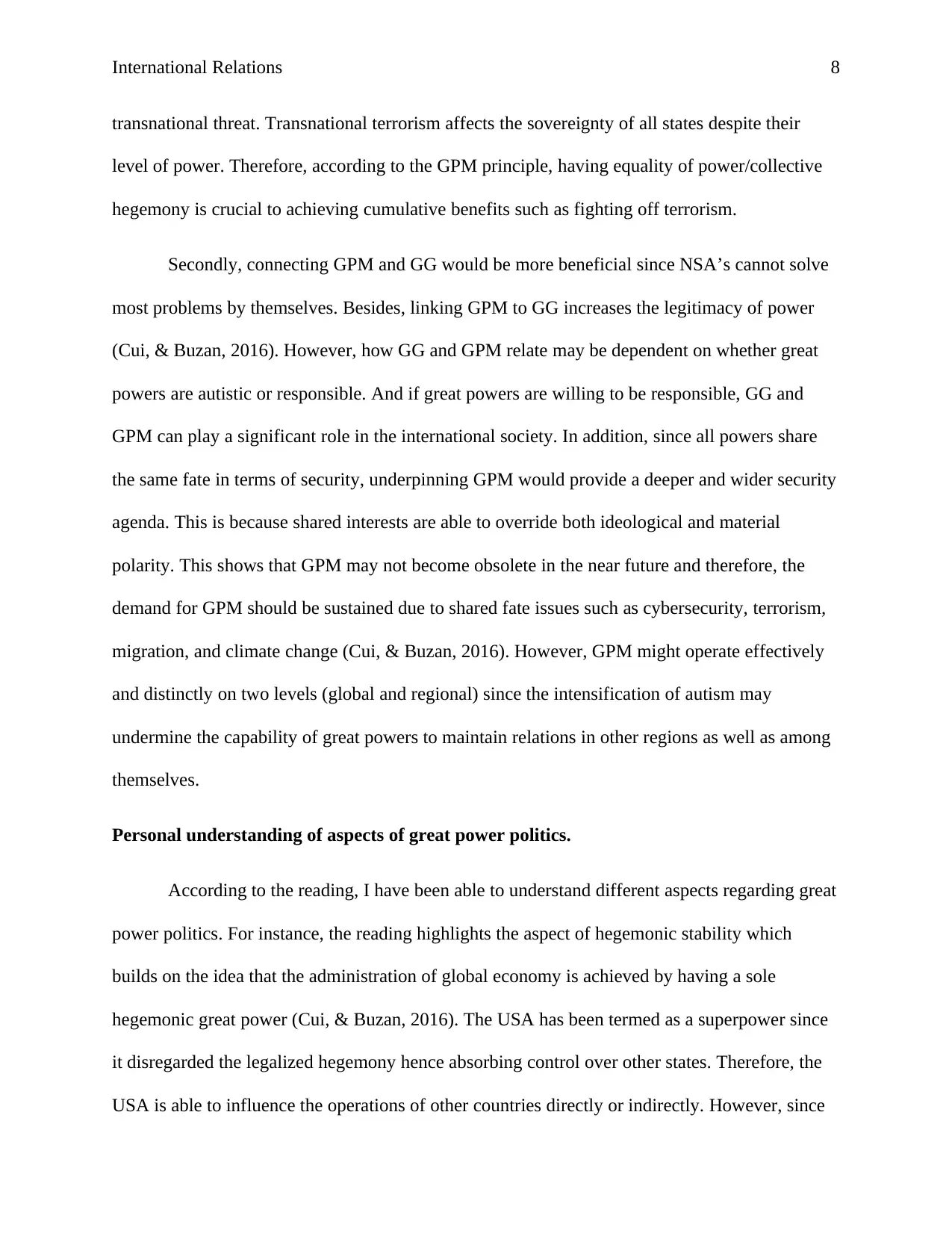
International Relations 8
transnational threat. Transnational terrorism affects the sovereignty of all states despite their
level of power. Therefore, according to the GPM principle, having equality of power/collective
hegemony is crucial to achieving cumulative benefits such as fighting off terrorism.
Secondly, connecting GPM and GG would be more beneficial since NSA’s cannot solve
most problems by themselves. Besides, linking GPM to GG increases the legitimacy of power
(Cui, & Buzan, 2016). However, how GG and GPM relate may be dependent on whether great
powers are autistic or responsible. And if great powers are willing to be responsible, GG and
GPM can play a significant role in the international society. In addition, since all powers share
the same fate in terms of security, underpinning GPM would provide a deeper and wider security
agenda. This is because shared interests are able to override both ideological and material
polarity. This shows that GPM may not become obsolete in the near future and therefore, the
demand for GPM should be sustained due to shared fate issues such as cybersecurity, terrorism,
migration, and climate change (Cui, & Buzan, 2016). However, GPM might operate effectively
and distinctly on two levels (global and regional) since the intensification of autism may
undermine the capability of great powers to maintain relations in other regions as well as among
themselves.
Personal understanding of aspects of great power politics.
According to the reading, I have been able to understand different aspects regarding great
power politics. For instance, the reading highlights the aspect of hegemonic stability which
builds on the idea that the administration of global economy is achieved by having a sole
hegemonic great power (Cui, & Buzan, 2016). The USA has been termed as a superpower since
it disregarded the legalized hegemony hence absorbing control over other states. Therefore, the
USA is able to influence the operations of other countries directly or indirectly. However, since
transnational threat. Transnational terrorism affects the sovereignty of all states despite their
level of power. Therefore, according to the GPM principle, having equality of power/collective
hegemony is crucial to achieving cumulative benefits such as fighting off terrorism.
Secondly, connecting GPM and GG would be more beneficial since NSA’s cannot solve
most problems by themselves. Besides, linking GPM to GG increases the legitimacy of power
(Cui, & Buzan, 2016). However, how GG and GPM relate may be dependent on whether great
powers are autistic or responsible. And if great powers are willing to be responsible, GG and
GPM can play a significant role in the international society. In addition, since all powers share
the same fate in terms of security, underpinning GPM would provide a deeper and wider security
agenda. This is because shared interests are able to override both ideological and material
polarity. This shows that GPM may not become obsolete in the near future and therefore, the
demand for GPM should be sustained due to shared fate issues such as cybersecurity, terrorism,
migration, and climate change (Cui, & Buzan, 2016). However, GPM might operate effectively
and distinctly on two levels (global and regional) since the intensification of autism may
undermine the capability of great powers to maintain relations in other regions as well as among
themselves.
Personal understanding of aspects of great power politics.
According to the reading, I have been able to understand different aspects regarding great
power politics. For instance, the reading highlights the aspect of hegemonic stability which
builds on the idea that the administration of global economy is achieved by having a sole
hegemonic great power (Cui, & Buzan, 2016). The USA has been termed as a superpower since
it disregarded the legalized hegemony hence absorbing control over other states. Therefore, the
USA is able to influence the operations of other countries directly or indirectly. However, since
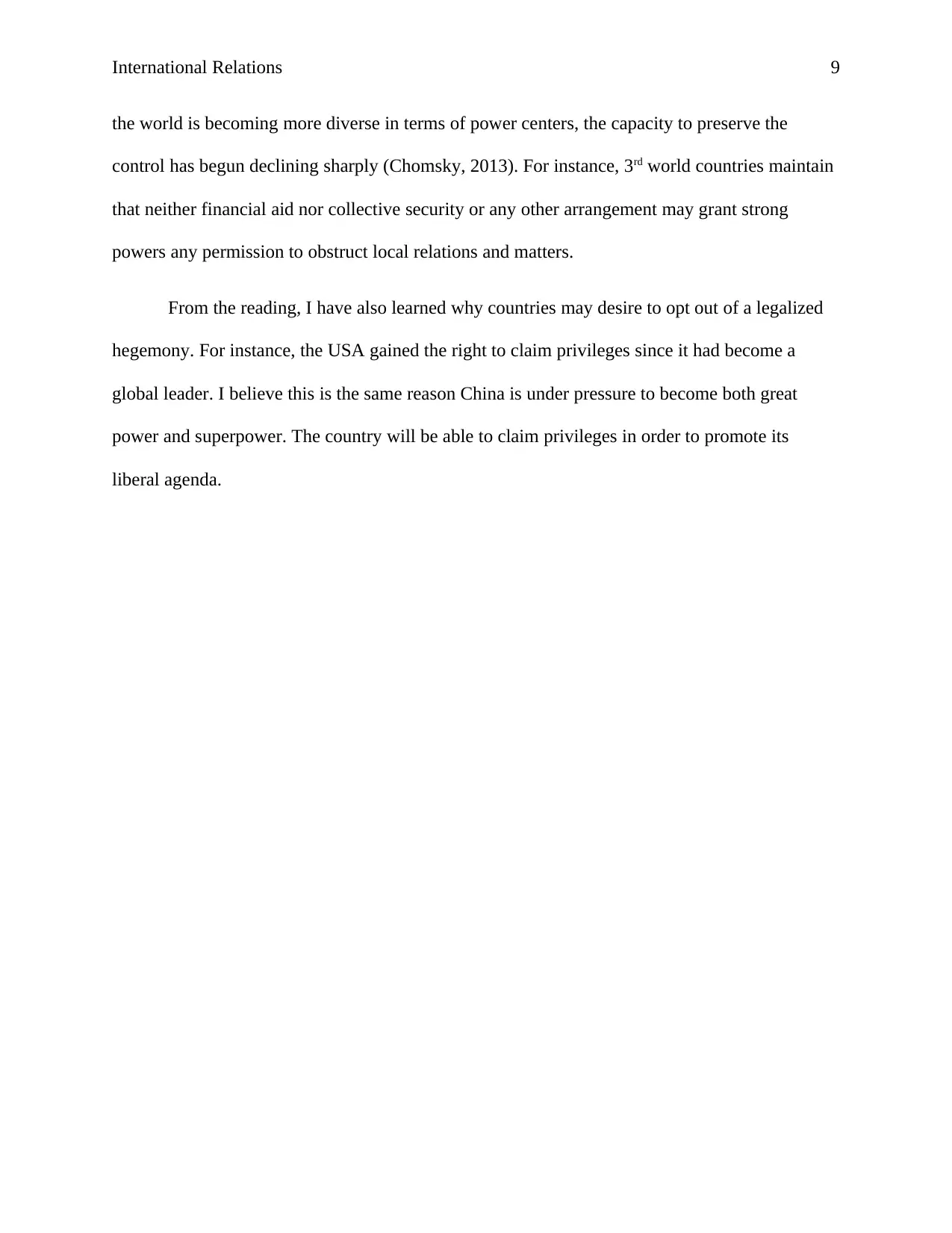
International Relations 9
the world is becoming more diverse in terms of power centers, the capacity to preserve the
control has begun declining sharply (Chomsky, 2013). For instance, 3rd world countries maintain
that neither financial aid nor collective security or any other arrangement may grant strong
powers any permission to obstruct local relations and matters.
From the reading, I have also learned why countries may desire to opt out of a legalized
hegemony. For instance, the USA gained the right to claim privileges since it had become a
global leader. I believe this is the same reason China is under pressure to become both great
power and superpower. The country will be able to claim privileges in order to promote its
liberal agenda.
the world is becoming more diverse in terms of power centers, the capacity to preserve the
control has begun declining sharply (Chomsky, 2013). For instance, 3rd world countries maintain
that neither financial aid nor collective security or any other arrangement may grant strong
powers any permission to obstruct local relations and matters.
From the reading, I have also learned why countries may desire to opt out of a legalized
hegemony. For instance, the USA gained the right to claim privileges since it had become a
global leader. I believe this is the same reason China is under pressure to become both great
power and superpower. The country will be able to claim privileges in order to promote its
liberal agenda.
⊘ This is a preview!⊘
Do you want full access?
Subscribe today to unlock all pages.

Trusted by 1+ million students worldwide
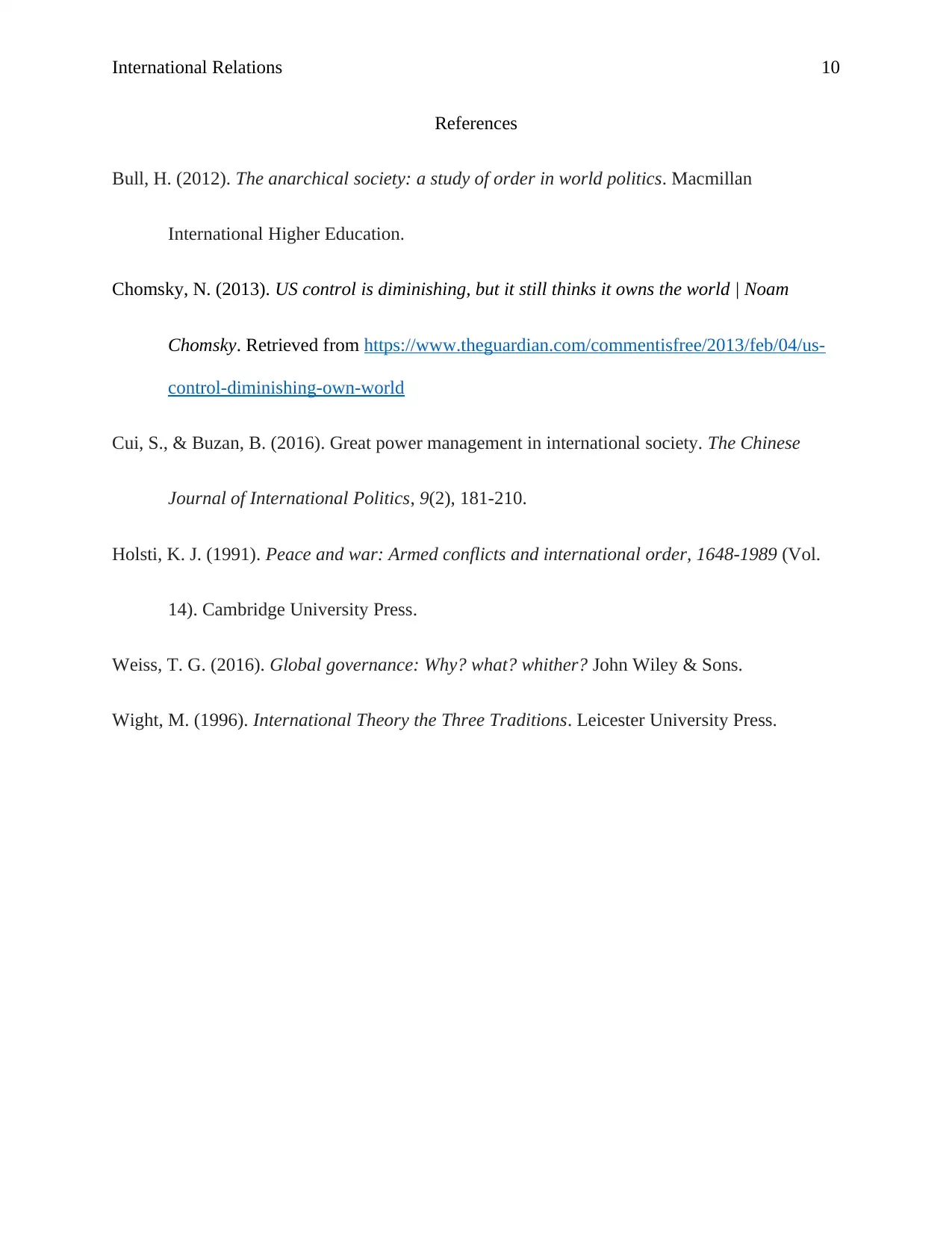
International Relations 10
References
Bull, H. (2012). The anarchical society: a study of order in world politics. Macmillan
International Higher Education.
Chomsky, N. (2013). US control is diminishing, but it still thinks it owns the world | Noam
Chomsky. Retrieved from https://www.theguardian.com/commentisfree/2013/feb/04/us-
control-diminishing-own-world
Cui, S., & Buzan, B. (2016). Great power management in international society. The Chinese
Journal of International Politics, 9(2), 181-210.
Holsti, K. J. (1991). Peace and war: Armed conflicts and international order, 1648-1989 (Vol.
14). Cambridge University Press.
Weiss, T. G. (2016). Global governance: Why? what? whither? John Wiley & Sons.
Wight, M. (1996). International Theory the Three Traditions. Leicester University Press.
References
Bull, H. (2012). The anarchical society: a study of order in world politics. Macmillan
International Higher Education.
Chomsky, N. (2013). US control is diminishing, but it still thinks it owns the world | Noam
Chomsky. Retrieved from https://www.theguardian.com/commentisfree/2013/feb/04/us-
control-diminishing-own-world
Cui, S., & Buzan, B. (2016). Great power management in international society. The Chinese
Journal of International Politics, 9(2), 181-210.
Holsti, K. J. (1991). Peace and war: Armed conflicts and international order, 1648-1989 (Vol.
14). Cambridge University Press.
Weiss, T. G. (2016). Global governance: Why? what? whither? John Wiley & Sons.
Wight, M. (1996). International Theory the Three Traditions. Leicester University Press.
1 out of 10
Your All-in-One AI-Powered Toolkit for Academic Success.
+13062052269
info@desklib.com
Available 24*7 on WhatsApp / Email
![[object Object]](/_next/static/media/star-bottom.7253800d.svg)
Unlock your academic potential
© 2024 | Zucol Services PVT LTD | All rights reserved.